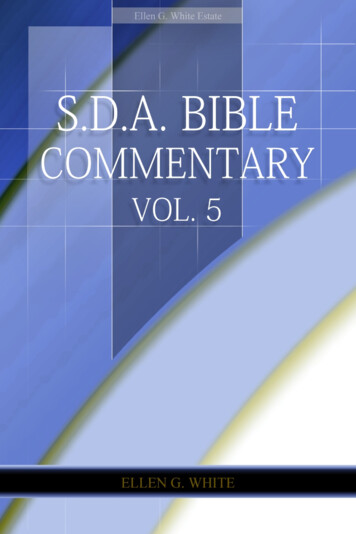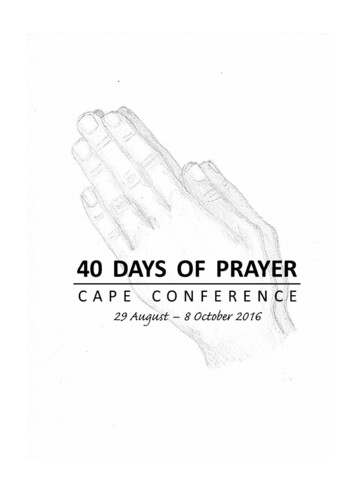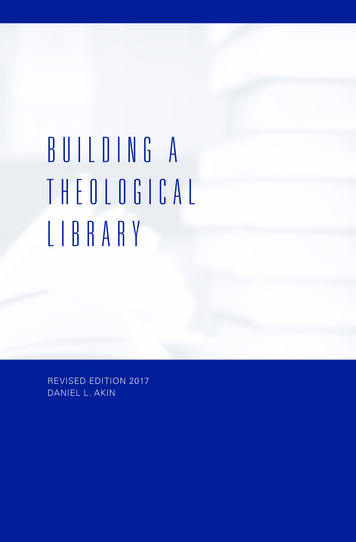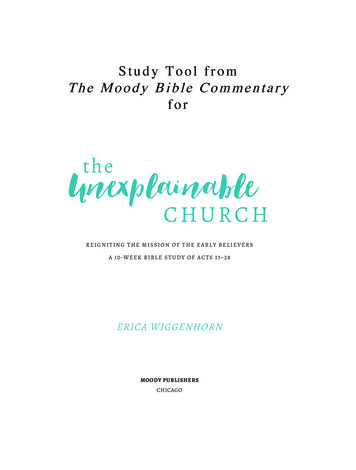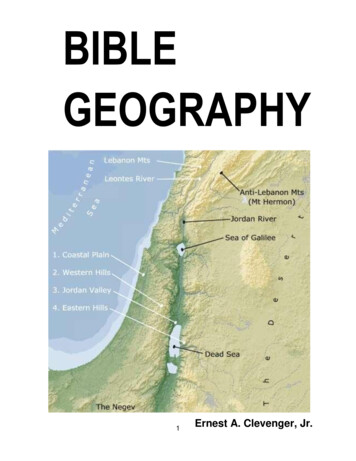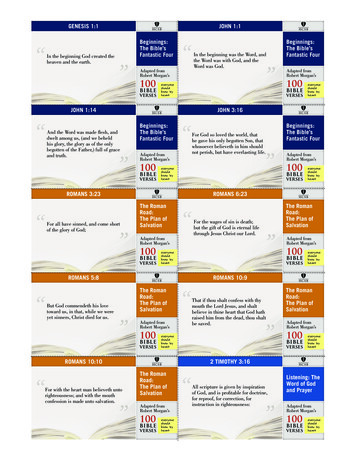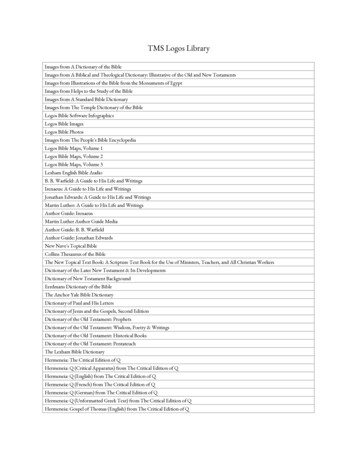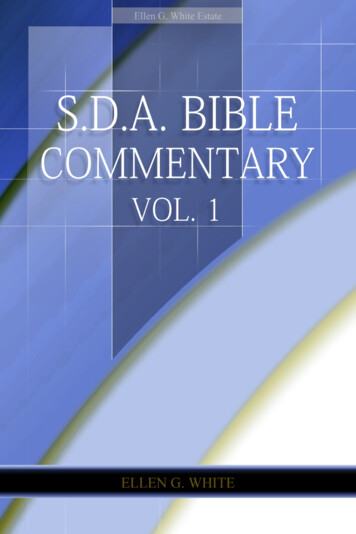
Transcription
S.D.A. BibleCommentary Vol. 1Ellen G. White1953Copyright 2017Ellen G. White Estate, Inc.
Information about this BookOverviewThis eBook is provided by the Ellen G. White Estate. It is includedin the larger free Online Books collection on the Ellen G. WhiteEstate Web site.About the AuthorEllen G. White (1827-1915) is considered the most widely translatedAmerican author, her works having been published in more than 160languages. She wrote more than 100,000 pages on a wide variety ofspiritual and practical topics. Guided by the Holy Spirit, she exaltedJesus and pointed to the Scriptures as the basis of one’s faith.Further LinksA Brief Biography of Ellen G. WhiteAbout the Ellen G. White EstateEnd User License AgreementThe viewing, printing or downloading of this book grants you onlya limited, nonexclusive and nontransferable license for use solelyby you for your own personal use. This license does not permitrepublication, distribution, assignment, sublicense, sale, preparationof derivative works, or other use. Any unauthorized use of this bookterminates the license granted hereby.Further InformationFor more information about the author, publishers, or how youcan support this service, please contact the Ellen G. White Estateat mail@whiteestate.org. We are thankful for your interest andfeedback and wish you God’s blessing as you read.i
ContentsInformation about this Book . . . . . . . . . . . . . . . . . . . . . . . . . . . . iGenesis . . . . . . . . . . . . . . . . . . . . . . . . . . . . . . . . . . . . . . . . . . . . . . . . 5Chapter 1 . . . . . . . . . . . . . . . . . . . . . . . . . . . . . . . . . . . . . . . . . . . . 6Chapter 2 . . . . . . . . . . . . . . . . . . . . . . . . . . . . . . . . . . . . . . . . . . . . 7Chapter 3 . . . . . . . . . . . . . . . . . . . . . . . . . . . . . . . . . . . . . . . . . . . . 9Chapter 4 . . . . . . . . . . . . . . . . . . . . . . . . . . . . . . . . . . . . . . . . . . . 17Chapter 5 . . . . . . . . . . . . . . . . . . . . . . . . . . . . . . . . . . . . . . . . . . 19Chapter 6 . . . . . . . . . . . . . . . . . . . . . . . . . . . . . . . . . . . . . . . . . . . 21Chapter 7 . . . . . . . . . . . . . . . . . . . . . . . . . . . . . . . . . . . . . . . . . . . 27Chapter 8 . . . . . . . . . . . . . . . . . . . . . . . . . . . . . . . . . . . . . . . . . . 28Chapter 9 . . . . . . . . . . . . . . . . . . . . . . . . . . . . . . . . . . . . . . . . . . 29Chapter 11 . . . . . . . . . . . . . . . . . . . . . . . . . . . . . . . . . . . . . . . . . . 31Chapter 12 . . . . . . . . . . . . . . . . . . . . . . . . . . . . . . . . . . . . . . . . . 32Chapter 13 . . . . . . . . . . . . . . . . . . . . . . . . . . . . . . . . . . . . . . . . . 34Chapter 14 . . . . . . . . . . . . . . . . . . . . . . . . . . . . . . . . . . . . . . . . . 35Chapter 15 . . . . . . . . . . . . . . . . . . . . . . . . . . . . . . . . . . . . . . . . . 36Chapter 18 . . . . . . . . . . . . . . . . . . . . . . . . . . . . . . . . . . . . . . . . . 38Chapter 19 . . . . . . . . . . . . . . . . . . . . . . . . . . . . . . . . . . . . . . . . . 39Chapter 22 . . . . . . . . . . . . . . . . . . . . . . . . . . . . . . . . . . . . . . . . . 40Chapter 25 . . . . . . . . . . . . . . . . . . . . . . . . . . . . . . . . . . . . . . . . . 42Chapter 28 . . . . . . . . . . . . . . . . . . . . . . . . . . . . . . . . . . . . . . . . . 43Chapter 31 . . . . . . . . . . . . . . . . . . . . . . . . . . . . . . . . . . . . . . . . . 45Chapter 32 . . . . . . . . . . . . . . . . . . . . . . . . . . . . . . . . . . . . . . . . . 46Chapter 35 . . . . . . . . . . . . . . . . . . . . . . . . . . . . . . . . . . . . . . . . . . 47Chapter 37 . . . . . . . . . . . . . . . . . . . . . . . . . . . . . . . . . . . . . . . . . 48Chapter 39 . . . . . . . . . . . . . . . . . . . . . . . . . . . . . . . . . . . . . . . . . 50Chapter 41 . . . . . . . . . . . . . . . . . . . . . . . . . . . . . . . . . . . . . . . . . 52Chapter 42 . . . . . . . . . . . . . . . . . . . . . . . . . . . . . . . . . . . . . . . . . 53Chapter 45 . . . . . . . . . . . . . . . . . . . . . . . . . . . . . . . . . . . . . . . . . 54Chapter 49 . . . . . . . . . . . . . . . . . . . . . . . . . . . . . . . . . . . . . . . . . 55Exodus . . . . . . . . . . . . . . . . . . . . . . . . . . . . . . . . . . . . . . . . . . . . . . . 57Chapter 1 . . . . . . . . . . . . . . . . . . . . . . . . . . . . . . . . . . . . . . . . . . 58Chapter 2 . . . . . . . . . . . . . . . . . . . . . . . . . . . . . . . . . . . . . . . . . . 59Chapter 3 . . . . . . . . . . . . . . . . . . . . . . . . . . . . . . . . . . . . . . . . . . 60ii
ContentsiiiChapter 4 . . . . . . . . . . . . . . . . . . . . . . . . . . . . . . . . . . . . . . . . . . 62Chapter 7 . . . . . . . . . . . . . . . . . . . . . . . . . . . . . . . . . . . . . . . . . . 64Chapter 8 . . . . . . . . . . . . . . . . . . . . . . . . . . . . . . . . . . . . . . . . . . 65Chapter 9 . . . . . . . . . . . . . . . . . . . . . . . . . . . . . . . . . . . . . . . . . . 66Chapter 11 . . . . . . . . . . . . . . . . . . . . . . . . . . . . . . . . . . . . . . . . . . 67Chapter 12 . . . . . . . . . . . . . . . . . . . . . . . . . . . . . . . . . . . . . . . . . 68Chapter 14 . . . . . . . . . . . . . . . . . . . . . . . . . . . . . . . . . . . . . . . . . 69Chapter 15 . . . . . . . . . . . . . . . . . . . . . . . . . . . . . . . . . . . . . . . . . 70Chapter 16 . . . . . . . . . . . . . . . . . . . . . . . . . . . . . . . . . . . . . . . . . . 71Chapter 17 . . . . . . . . . . . . . . . . . . . . . . . . . . . . . . . . . . . . . . . . . 73Chapter 18 . . . . . . . . . . . . . . . . . . . . . . . . . . . . . . . . . . . . . . . . . 74Chapter 19 . . . . . . . . . . . . . . . . . . . . . . . . . . . . . . . . . . . . . . . . . 75Chapter 20 . . . . . . . . . . . . . . . . . . . . . . . . . . . . . . . . . . . . . . . . . . 77Chapter 21 . . . . . . . . . . . . . . . . . . . . . . . . . . . . . . . . . . . . . . . . . 83Chapter 23 . . . . . . . . . . . . . . . . . . . . . . . . . . . . . . . . . . . . . . . . . 84Chapter 24 . . . . . . . . . . . . . . . . . . . . . . . . . . . . . . . . . . . . . . . . . 85Chapter 25 . . . . . . . . . . . . . . . . . . . . . . . . . . . . . . . . . . . . . . . . . 86Chapter 26 . . . . . . . . . . . . . . . . . . . . . . . . . . . . . . . . . . . . . . . . . . 87Chapter 27 . . . . . . . . . . . . . . . . . . . . . . . . . . . . . . . . . . . . . . . . . 88Chapter 31 . . . . . . . . . . . . . . . . . . . . . . . . . . . . . . . . . . . . . . . . . 89Chapter 32 . . . . . . . . . . . . . . . . . . . . . . . . . . . . . . . . . . . . . . . . . 92Chapter 34 . . . . . . . . . . . . . . . . . . . . . . . . . . . . . . . . . . . . . . . . . 93Leviticus . . . . . . . . . . . . . . . . . . . . . . . . . . . . . . . . . . . . . . . . . . . . . 95Chapter 1 . . . . . . . . . . . . . . . . . . . . . . . . . . . . . . . . . . . . . . . . . . 96Chapter 5 . . . . . . . . . . . . . . . . . . . . . . . . . . . . . . . . . . . . . . . . . . . 97Chapter 8 . . . . . . . . . . . . . . . . . . . . . . . . . . . . . . . . . . . . . . . . . . 98Chapter 10 . . . . . . . . . . . . . . . . . . . . . . . . . . . . . . . . . . . . . . . . . 99Chapter 14 . . . . . . . . . . . . . . . . . . . . . . . . . . . . . . . . . . . . . . . . 100Chapter 16 . . . . . . . . . . . . . . . . . . . . . . . . . . . . . . . . . . . . . . . . 101Chapter 17 . . . . . . . . . . . . . . . . . . . . . . . . . . . . . . . . . . . . . . . . 102Chapter 25 . . . . . . . . . . . . . . . . . . . . . . . . . . . . . . . . . . . . . . . . 103Numbers . . . . . . . . . . . . . . . . . . . . . . . . . . . . . . . . . . . . . . . . . . . . 105Chapter 11 . . . . . . . . . . . . . . . . . . . . . . . . . . . . . . . . . . . . . . . . 106Chapter 12 . . . . . . . . . . . . . . . . . . . . . . . . . . . . . . . . . . . . . . . . 107Chapter 13 . . . . . . . . . . . . . . . . . . . . . . . . . . . . . . . . . . . . . . . . 109Chapter 14 . . . . . . . . . . . . . . . . . . . . . . . . . . . . . . . . . . . . . . . . 110Chapter 15 . . . . . . . . . . . . . . . . . . . . . . . . . . . . . . . . . . . . . . . . 111Chapter 16 . . . . . . . . . . . . . . . . . . . . . . . . . . . . . . . . . . . . . . . . 112
ivSDA Bible Commentary, vol. 1 (EGW)Chapter 17 . . . . . . . . . . . . . . . . . . . . . . . . . . . . . . . . . . . . . . . .Chapter 20 . . . . . . . . . . . . . . . . . . . . . . . . . . . . . . . . . . . . . . . .Chapter 21 . . . . . . . . . . . . . . . . . . . . . . . . . . . . . . . . . . . . . . . .Chapter 22 . . . . . . . . . . . . . . . . . . . . . . . . . . . . . . . . . . . . . . . .Chapter 24 . . . . . . . . . . . . . . . . . . . . . . . . . . . . . . . . . . . . . . . .Chapter 25 . . . . . . . . . . . . . . . . . . . . . . . . . . . . . . . . . . . . . . . .Chapter 26 . . . . . . . . . . . . . . . . . . . . . . . . . . . . . . . . . . . . . . . .Chapter 29 . . . . . . . . . . . . . . . . . . . . . . . . . . . . . . . . . . . . . . . .Deuteronomy . . . . . . . . . . . . . . . . . . . . . . . . . . . . . . . . . . . . . . . .Chapter 1 . . . . . . . . . . . . . . . . . . . . . . . . . . . . . . . . . . . . . . . . .Chapter 4 . . . . . . . . . . . . . . . . . . . . . . . . . . . . . . . . . . . . . . . . .Chapter 6 . . . . . . . . . . . . . . . . . . . . . . . . . . . . . . . . . . . . . . . . .Chapter 9 . . . . . . . . . . . . . . . . . . . . . . . . . . . . . . . . . . . . . . . . .Chapter 15 . . . . . . . . . . . . . . . . . . . . . . . . . . . . . . . . . . . . . . . .Chapter 18 . . . . . . . . . . . . . . . . . . . . . . . . . . . . . . . . . . . . . . . .Chapter 23 . . . . . . . . . . . . . . . . . . . . . . . . . . . . . . . . . . . . . . . .Chapter 26 . . . . . . . . . . . . . . . . . . . . . . . . . . . . . . . . . . . . . . . .Chapter 30 . . . . . . . . . . . . . . . . . . . . . . . . . . . . . . . . . . . . . . . 33135
Genesis
Chapter 11-3 (Psalm 33:6, 9). A Reservoir of Means—God spoke, andHis words created His works in the natural world. God’s creation isbut a reservoir of means made ready for Him to employ instantly todo His pleasure (Letter 131, 1897).26 (Ephesians 3:15). A Larger Family—Infinite love—howgreat it is! God made the world to enlarge heaven. He desires alarger family of created intelligences (Manuscript 78, 1901).27. Man, a New and Distinct Order—All heaven took a deepand joyful interest in the creation of the world and of man. Humanbeings were a new and distinct order. They were made “in the imageof God,” and it was the Creator’s design that they should populatethe earth (The Review and Herald, February 11, 1902).29 (Psalm 104:14). Fruit in Our Hands—The Lord has givenHis life to the trees and vines of His creation. His word can increaseor decrease the fruit of the land. If men would open their understanding to discern the relation between nature and nature’s God,faithful acknowledgments of the Creator’s power would be heard.Without the life of God, nature would die. His creative works aredependent on Him. He bestows life-giving properties on all thatnature produces. We are to regard the trees laden with fruit as thegift of God, just as much as though He placed the fruit in our hands(Manuscript 114, 1899).6
Chapter 22 (Exodus 20:8-11). Seven Literal Days—The weekly cycle ofseven literal days, six for labor, and the seventh for rest, which hasbeen preserved and brought down through Bible history, originatedin the great fact of the first seven days (Spiritual Gifts 3:90).7 (1 Corinthians 3:9; Acts 17:28). Man Under God’s Supervision—The physical organism of man is under the supervision ofGod; but it is not like a clock, which is set in operation, and mustgo of itself. The heart beats, pulse succeeds pulse, breath succeedsbreath, but the entire being is under the supervision of God. “Ye areGod’s husbandry, ye are God’s building.” In God we live and moveand have our being. Each heart-beat, each breath, is the inspirationof Him who breathed into the nostrils of Adam the breath of life,—the inspiration of the ever-present God, the Great I AM (The Reviewand Herald, November 8, 1898).(2 Peter 1:4). Partakers of God’s Nature—The Lord created [1082]man out of the dust of the earth. He made Adam a partaker ofHis life, His nature. There was breathed into him the breath of theAlmighty, and he became a living soul. Adam was perfect in form—strong, comely, pure, bearing the image of his Maker (Manuscript102, 1903).Physical Power Long Preserved—Man came from the handof his Creator perfect in organization and beautiful in form. Thefact that he has for six thousand years withstood the ever-increasingweight of disease and crime is conclusive proof of the power ofendurance with which he was first endowed (Christian Temperanceand Bible Hygiene, 7).8. Adam Crowned King in Eden—Adam was crowned kingin Eden. To him was given dominion over every living thing thatGod had created. The Lord blessed Adam and Eve with intelligencesuch as He had not given to any other creature. He made Adam therightful sovereign over all the works of His hands. Man, made in the7
8SDA Bible Commentary, vol. 1 (EGW)divine image, could contemplate and appreciate the glorious worksof God in nature (Redemption; or the Temptation of Christ, 7).15. Eden, Heaven in Miniature—Adam had themes for contemplation in the works of God in Eden, which was heaven in miniature. God did not form man merely to contemplate His gloriousworks; therefore, He gave him hands for labor, as well as a mindand heart for contemplation. If the happiness of man consisted indoing nothing, the Creator would not have given Adam his appointedwork. Man was to find happiness in labor, as well as in meditation(Christian Temperance and Bible Hygiene, 7, 8).16, 17 (Genesis 1:26; Isaiah 43:6, 7). To Re-populate HeavenAfter Test—God created man for His own glory, that after test andtrial the human family might become one with the heavenly family.It was God’s purpose to re-populate heaven with the human family,if they would show themselves obedient to His every word. Adamwas to be tested, to see whether he would be obedient, as the loyalangels, or disobedient. If he stood the test, his instruction to hischildren would have been only of loyalty. His mind and thoughtswould have been as the mind and thoughts of God. He would havebeen taught by God as His husbandry and building. His characterwould have been moulded in accordance with the character of God(Letter 91, 1900).17 (John 8:44; Genesis 3:4). Seeds of Death Satan’s Work—Christ never planted the seeds of death in the system. Satan plantedthese seeds when he tempted Adam to eat of the tree of knowledgewhich meant disobedience to God (Manuscript 65, 1899) [publishedin F. D. Nichol, Ellen G. White and Her Critics].(Revelation 13:8). Death Penalty Not Enforced at Once—Adam listened to the words of the tempter, and yielding to hisinsinuations, fell into sin. Why was not the death penalty at onceenforced in his case?—Because a ransom was found. God’s onlybegotten Son volunteered to take the sin of man upon Himself, andto make an atonement for the fallen race. There could have beenno pardon for sin had this atonement not been made. Had Godpardoned Adam’s sin without an atonement, sin would have beenimmortalized, and would have been perpetuated with a boldness thatwould have been without restraint (The Review and Herald, April23, 1901).
Chapter 31-6. A Succession of Falls—If the race had ceased to fall whenAdam was driven from Eden, we should now be in a far moreelevated condition physically, mentally, and morally. But while mendeplore the fall of Adam, which has resulted in such unutterablewoe, they disobey the express injunctions of God, as did Adam,although they have his example to warn them from doing as he didin violating the law of Jehovah. Would that man had stopped fallingwith Adam. But there has been a succession of falls. Men will nottake warning from Adam’s experience. They will indulge appetiteand passion in direct violation of the law of God, and at the sametime continue to mourn Adam’s transgression, which brought sininto the world.From Adam’s day to ours there has been a succession of falls,each greater than the last, in every species of crime. God did notcreate a race of beings so devoid of health, beauty, and moral poweras now exists in the world. Disease of every kind has been fearfully [1083]increasing upon the race. This has not been by God’s especialprovidence, but directly contrary to His will. It has come by man’sdisregard of the very means which God has ordained to shield himfrom the terrible evils existing (The Review and Herald, March 4,1875).1. Satan Uses Instruments—In Eden Satan used the serpent ashis instrument. Today he makes use of the members of the humanfamily, striving by means of every species of cunning and deceptionto hedge up the path of righteousness cast up for the ransomed ofthe Lord to walk in (Letter 91, 1900).5. No Change in Satan’s Propaganda—God does not consultour opinions or preferences. He knows what human beings do notknow,—the future results of every movement, and therefore oureyes should be directed to Him, and not to the worldly advantagespresented by Satan. Satan tells us that if we give heed to him, weshall reach great heights of knowledge. Ye shall be as gods, he9
10SDA Bible Commentary, vol. 1 (EGW)said to Eve, if you eat of the tree forbidden by God. The test givento Adam and Eve was very light, but they could not bear it. Theydisobeyed God, and this transgression opened the floodgates of woeon our world (Manuscript 50, 1893).6. Mildest Test Given—With what intense interest the wholeuniverse watched the conflict that was to decide the position ofAdam and Eve. How attentively the angels listened to the words ofSatan, the originator of sin, as he placed his own ideas above thecommands of God, and sought to make of none effect the law ofGod through his deceptive reasoning! How anxiously they waitedto see if the holy pair would be deluded by the tempter, and yieldto his arts! They asked themselves, Will the holy pair transfer theirfaith and love from the Father and Son to Satan? Will they accepthis falsehoods as truth? They knew that they might refrain fromtaking the fruit, and obey the positive injunction of God, or theymight violate the express command of their Creator.The mildest test was given them that could be given; for therewas no need of their eating of the forbidden tree; everything thattheir wants required had been provided (The Bible Echo, July 24,1899).Gained Only a Knowledge of Sin and Its Results—If Adamand Eve had never touched the forbidden tree, the Lord would haveimparted to them knowledge,—knowledge upon which rested nocurse of sin, knowledge that would have brought them everlastingjoy. The only knowledge they gained by their disobedience was aknowledge of sin and its results ((Australasian) Union ConferenceRecord, March 1, 1904).Adam’s Fall Inexplainable—In what consisted the strength ofthe assault made upon Adam, which caused his fall? It was notindwelling sin; for God made Adam after His own character, pureand upright. There were no corrupt principles in the first Adam, nocorrupt propensities or tendencies to evil. Adam was as faultless asthe angels before God’s throne. These things are inexplainable, butmany things which now we cannot understand will be made plainwhen we shall see as we are seen, and know as we are known (Letter191, 1899).(Ecclesiastes 1:13-18)—Age after age, the curiosity of men hasled them to seek for the tree of knowledge; and often they think they
Chapter 311are plucking fruit most essential, when, like Solomon’s research,they find it altogether vanity and nothingness in comparison withthat science of true holiness which will open to them the gates ofthe city of God. The human ambition has been seeking for thatkind of knowledge that will bring to them glory and self-exaltationand supremacy. Thus Adam and Eve were worked upon by Satanuntil God’s restraint was snapped asunder, and their education underthe teacher of lies began in order that they might have the knowledge which God had refused them,—to know the consequence oftransgression (Manuscript 67, 1898).Fall Broke Golden Chain of Obedience—Adam yielded totemptation and as we have the matter of sin and its consequencelaid so distinctly before us, we can read from cause to effect andsee the greatness of the act is not that which constitutes sin; but thedisobedience of God’s expressed will, which is a virtual denial ofGod, refusing the laws of His government.The fall of our first parents broke the golden chain of implicitobedience of the human will to the divine. Obedience has no longer [1084]been deemed an absolute necessity. The human agents follow theirown imaginations which the Lord said of the inhabitants of the oldworld was evil and that continually (Manuscript 1, 1892).Adam: Temptation Removed as Far as Possible—The planof salvation was so arranged that when Adam was tested, temptationwas removed from him as far as possible. When Adam was tempted,he was not hungry (The Signs of the Times, April 4, 1900).Man a Free Agent—God had power to hold Adam back fromtouching the forbidden fruit; but had He done this, Satan would havebeen sustained in his charge against God’s arbitrary rule. Man wouldnot have been a free moral agent, but a mere machine (The Reviewand Herald, June 4, 1901).Every Inducement to Remain Loyal—It certainly was notGod’s purpose that man should be sinful. He made Adam pureand noble, with no tendency to evil. He placed him in Eden, wherehe had every inducement to remain loyal and obedient. The law wasplaced around him as a safeguard. (Ibid.).7. Fig Leaves Will Not Cover Sin—Adam and Eve both ateof the fruit, and obtained a knowledge which, had they obeyedGod, they would never have had,—an experience in disobedience
12SDA Bible Commentary, vol. 1 (EGW)and disloyalty to God,—the knowledge that they were naked. Thegarment of innocence, a covering from God, which surrounded them,departed; and they supplied the place of this heavenly garment bysewing together fig-leaves for aprons.This is the covering that the transgressors of the law of Godhave used since the days of Adam and Eve’s disobedience. Theyhave sewed together fig-leaves to cover their nakedness, caused bytransgression. The fig-leaves represent the arguments used to coverdisobedience. When the Lord calls the attention of men and womento the truth, the making of fig-leaves into aprons will be begun, tohide the nakedness of the soul. But the nakedness of the sinner isnot covered. All the arguments pieced together by all who haveinterested themselves in this flimsy work will come to naught (TheReview and Herald, November 15, 1898).10, 11. Drew on Robes of Ignorance—Had Adam and Evenever disobeyed their Creator, had they remained in the path ofperfect rectitude, they could have known and understood God. Butwhen they listened to the voice of the tempter, and sinned againstGod, the light of the garments of heavenly innocence departed fromthem; and in parting with the garments of innocence, they drew aboutthem the dark robes of ignorance of God. The clear and perfect lightthat had hitherto surrounded them had lightened everything theyapproached; but deprived of that heavenly light, the posterity ofAdam could no longer trace the character of God in His createdworks (The Review and Herald, March 17, 1904).15. Adam Knew Original Law—Adam and Eve at their creation had knowledge of the original law of God. It was imprintedupon their hearts, and they were acquainted with the claims of lawupon them. When they transgressed the law of God, and fell fromtheir state of happy innocence, and became sinners, the future of thefallen race was not relieved by a single ray of hope. God pitied them,and Christ devised the plan for their salvation by Himself bearing theguilt. When the curse was pronounced upon the earth and upon man,in connection with the curse was a promise that through Christ therewas hope and pardon for the transgression of God’s law. Althoughgloom and darkness hung, like the pall of death, over the future, yetin the promise of the Redeemer, the Star of hope lighted up the darkfuture. The gospel was first preached to Adam by Christ. Adam and
Chapter 313Eve felt sincere sorrow and repentance for their guilt. They believedthe precious promise of God, and were saved from utter ruin (TheReview and Herald, April 29, 1875).Christ the Immediate Surety—As soon as there was sin, therewas a Saviour. Christ knew that He would have to suffer, yet Hebecame man’s substitute. As soon as Adam sinned, the Son of Godpresented Himself as surety for the human race, with just as muchpower to avert the doom pronounced upon the guilty as when Hedied upon the cross of Calvary (The Review and Herald, March 12,1901).Continent of Heaven—Jesus became the world’s Redeemer,rendering perfect obedience to every word that proceedeth out of [1085]the mouth of God. He redeemed Adam’s disgraceful fall, unitingthe earth, that had been divorced from God by sin, to the continentof heaven [Obviously the word “continent” is here employed in abroader sense than is commonly understood today. It is in keepingwith usage now obsolete, which permitted the word “continent” toapply to “the ‘solid globe’ or orb of the sun or moon” (See OxfordEnglish Dictionary).—Editor.] (Bible Echo and Signs of the Times,August 6, 1894).Connected With Sphere of Glory—Though earth was struckoff from the continent of heaven [Obviously the word “continent”is here employed in a broader sense than is commonly understoodtoday. It is in keeping with usage now obsolete, which permittedthe word “continent” to apply to “the ‘solid globe’ or orb of the sunor moon” (See Oxford English Dictionary).—Editor.] and alienatedfrom its communion, Jesus has connected it again with the sphere ofglory (ST November 24, 1887).Instantaneous Substitution—The instant man accepted thetemptations of Satan, and did the very things God had said he shouldnot do, Christ, the Son of God, stood between the living and thedead, saying, “Let the punishment fall on Me. I will stand in man’splace. He shall have another chance” (Letter 22, February 13, 1900).Christ Placed Feet in Adam’s Steps—What love! What amazing condescension! The King of glory proposed to humble Himselfto fallen humanity! He would place His feet in Adam’s steps. Hewould take man’s fallen nature, and engage to cope with the strongfoe who triumphed over Adam. He would overcome Satan, and
14SDA Bible Commentary, vol. 1 (EGW)in thus doing He would open the way for the redemption from thedisgrace of Adam’s failure and fall, of all those who would believeon Him (Redemption; or the Temptation of Christ in The Wilderness,15).16, 17. Execution of Sentence Withheld—God forbears, for atime, the full execution of the sentence of death pronounced uponman. Satan flattered himself that he had forever broken the linkbetween heaven and earth. But in this he was greatly mistaken anddisappointed. The Father had given the world into the hands of HisSon for Him to redeem from the curse and the disgrace of Adam’sfailure and fall (Redemption; or the Temptation of Christ in TheWilderness, 17).17, 18. The Curse on All Creation—All nature is confused;for God forbade the earth to carry out the purpose He had originallydesigned for it. Let there be no peace to the wicked, saith the Lord.The curse of God is upon all creation. Every year it makes itselfmore decidedly felt (Manuscript 76a, 1901).The first curse was pronounced upon the posterity of Adam andupon the earth, because of disobedience. The second curse cameupon the ground after Cain slew his brother Abel. The third mostdreadful curse from God, came upon the earth at the Flood (SpiritualGifts 4a:121).The land has felt the curse, more and more heavily. Before theFlood, the first leaf which fell, and was discovered decaying upon theground, caused those who feared God great sorrow. They mournedover it as we mourn over the loss of a dead friend. In the decayingleaf they could see an evidence of the curse, and of the decay ofnature (Spiritual Gifts 4a:155).(Romans 8:22)—The sin of man has brought the sure result,—decay, deformity, and death. Today the whole world is tainted,corrupted, stricken with mortal disease. The earth groaneth underthe continual transgression of the inhabitants thereof (Letter 22,February 13, 1900).The Lord’s curse is upon the earth, upon man, upon beast, uponthe fish in the sea, and as transgression becomes almost universalthe curse will be permitted to become as broad and as deep as thetransgression (Letter 59, 1898).
Chapter 315Tokens of God’s Continued Love—After the transgression ofAdam, God might have destroyed every opening bud and bloomingflower, or He might have taken away their fragrance, so gratefulto the senses. In the earth seared and marred by the curse, in thebriers, the thistles, the thorns, the tares, we may read the law ofcondemnation; but in the delicate color and perfume of the flowers,we may learn that God still loves us, that His mercy is not whollywithdrawn from the earth (The Review and Herald, November 8,1898).17-19—God said to Adam, and to all the descendants of Adam,In the sweat of thy face shalt thou eat bread; for from henceforth theearth must be worked under the drawback of transgression. Thornsand briars shall it produce (Manuscript 84, 1897).There is no place upon earth where the track of the serpent is not [1086]seen and his venomous sting felt. The whole earth is defiled underthe inhabitants thereof. The curse is increasing as transgressionincreases (Letter 22, February 13, 1900).18. Amalgamation Brought Noxious Plants—Not one noxious plant was placed in the Lord’s great garden, but after Adam andEve sinned, poisonous herbs sp
8 SDA Bible Commentary, vol. 1 (EGW) divine image, could contemplate and appreciate the glorious works of God in nature (Redemption; or the Temptation of Christ, 7). 15. Eden, Heaven in Miniature—Adam had themes for con-templation in the works of God in Eden, which was heaven in minia-ture. God did not form man merely to contemplate His glorious
